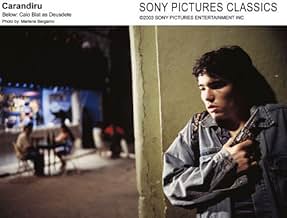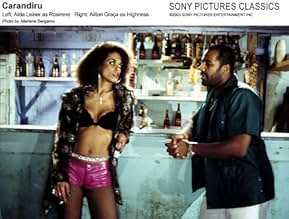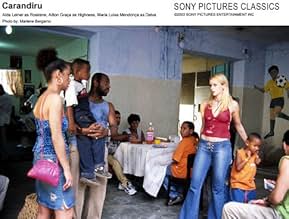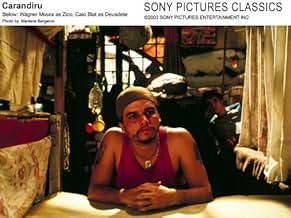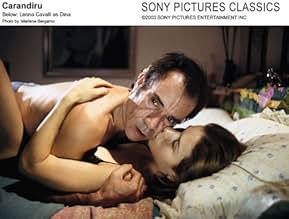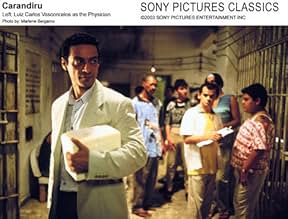AVALIAÇÃO DA IMDb
7,6/10
24 mil
SUA AVALIAÇÃO
Histórias de crime, vingança, amor e amizade na Casa de Detenção de São Paulo, o maior presídio da América Latina.Histórias de crime, vingança, amor e amizade na Casa de Detenção de São Paulo, o maior presídio da América Latina.Histórias de crime, vingança, amor e amizade na Casa de Detenção de São Paulo, o maior presídio da América Latina.
- Direção
- Roteiristas
- Artistas
- Prêmios
- 16 vitórias e 33 indicações no total
Enrique Diaz
- Gilson
- (as Enrique Díaz)
Aida Leiner
- Rosirene
- (as Aída Leiner)
Avaliações em destaque
'Carandiru' is a film based on the real experiences of Dr Drauzio Varella. He worked in Carandiru prison in Sao Paulo, Brazil, in the late 80s/early 90s carrying out Aids prevention work. During his work he came to know a lot of the inmates closely, and as he was a doctor got to see prison life in a way the other prison workers didn't. He made friends with a lot of the inmates, and learned a lot of their personal stories. The prison is extremely cramped, and the situation came to a climax in 1992. One entire block of the prison fell under prisoner control and a riot squad was sent in, killing 111 men.
The film is being dubbed by some as "this year's City of God", but it's very different to last years Brazillian smash. Where 'City of God' had some very flashy direction and MTV-ized zip-bang editing, 'Carandiru' is pretty straight forward. The film still has some great direction though, Hector Babenco has a leisurely style (matched by his actual output, it's been 7 years since his last film, and nearly 20 since 'Ironweed'), allowing the story the space it needs to breathe but still picking up the pace to build tension. Ironically the only section of the film I didn't really like was the bit that was the most 'City of God'-like. When the doctor is dealing with his patients he asks each one what their story is, and sometimes it's a bit forced, just like in 'City of God' with the "now it's my turn to tell you my story".
Where it's very similar to 'City of God' is it's themes - it's essentially a humanist comedy with a moral edge, dealing with love, hate, revenge, innocence and betrayal. The cons are poor and murderous, but lovable at the same time. If this film and 'City of God' are to believed drug-dealing thieving murderers all have their hearts in the right place and are all okay guys who just took a wrong turn on the road.
There's a bit of a stink being kicked up at the moment on the imdb forum for 'Carandiru'. A lot of Brazillian's are posting, very upset with filmmakers consistently showing Brazil in a negative light. I think that although both films do have that slant to them, they have actually increased interested in the country, and even more so the countries film output, taking it to a global audience. If all Scottish films are to be believed we're all a bunch of Glasweigan Gangster Hardnuts or heroin-addicted thieving murderers too, so I fail to see what the fuss is about.
The director drives home the real point of the film in the last 20 minutes. The overcrowding and in-fighting finally erupts into a full-blown riot that results in the main characters block being taken over by the prisoners. A riot squad enters, and the ensuing rampage is one of the most graphic and genuinely shocking ever committed to film. Definitely not for the faint-of-heart. I remember seeing the prison riot being reported in the UK news, and being appalled at how crowded the prison was, and how a government could let it reach boiling point like that. The last 20 minutes really smacked that home, but with the closing shots of the prison finally being demolished in 2002 you feel like there was at least some sort of closure on the tragedy.
The story is harrowing, but heart-warming, and the acting (mostly from unknowns) is top rate. It's my favorite film of the year so far, but do beware the last 20 minutes, you won't leave the cinema feeling happy.
The film is being dubbed by some as "this year's City of God", but it's very different to last years Brazillian smash. Where 'City of God' had some very flashy direction and MTV-ized zip-bang editing, 'Carandiru' is pretty straight forward. The film still has some great direction though, Hector Babenco has a leisurely style (matched by his actual output, it's been 7 years since his last film, and nearly 20 since 'Ironweed'), allowing the story the space it needs to breathe but still picking up the pace to build tension. Ironically the only section of the film I didn't really like was the bit that was the most 'City of God'-like. When the doctor is dealing with his patients he asks each one what their story is, and sometimes it's a bit forced, just like in 'City of God' with the "now it's my turn to tell you my story".
Where it's very similar to 'City of God' is it's themes - it's essentially a humanist comedy with a moral edge, dealing with love, hate, revenge, innocence and betrayal. The cons are poor and murderous, but lovable at the same time. If this film and 'City of God' are to believed drug-dealing thieving murderers all have their hearts in the right place and are all okay guys who just took a wrong turn on the road.
There's a bit of a stink being kicked up at the moment on the imdb forum for 'Carandiru'. A lot of Brazillian's are posting, very upset with filmmakers consistently showing Brazil in a negative light. I think that although both films do have that slant to them, they have actually increased interested in the country, and even more so the countries film output, taking it to a global audience. If all Scottish films are to be believed we're all a bunch of Glasweigan Gangster Hardnuts or heroin-addicted thieving murderers too, so I fail to see what the fuss is about.
The director drives home the real point of the film in the last 20 minutes. The overcrowding and in-fighting finally erupts into a full-blown riot that results in the main characters block being taken over by the prisoners. A riot squad enters, and the ensuing rampage is one of the most graphic and genuinely shocking ever committed to film. Definitely not for the faint-of-heart. I remember seeing the prison riot being reported in the UK news, and being appalled at how crowded the prison was, and how a government could let it reach boiling point like that. The last 20 minutes really smacked that home, but with the closing shots of the prison finally being demolished in 2002 you feel like there was at least some sort of closure on the tragedy.
The story is harrowing, but heart-warming, and the acting (mostly from unknowns) is top rate. It's my favorite film of the year so far, but do beware the last 20 minutes, you won't leave the cinema feeling happy.
Carandiru is the true story of the greatest massacre of prisoners in the world. It happened in 1992, in São Paulo, after a rebellion in the greatest Brazilian penitentiary. Doctor Drauzio Varella has written a successful best-seller about this sad event. The great Brazilian naturalized director Hector Babenco (from `Pixote', `Kiss of the Spider Woman', `Lúcio Flávio' etc.), with the support of a fantastic cast, presented a good movie about this wound in our society. The screenplay presents some personal dramas of some prisoners before the invasion of the prison by the Military Police and execution of one hundred and eleven (111) prisoners. The double Brazilian DVD is magnificent:, presenting not only the usual making-of, interviews, deleted scenes and errors, but also the TV News in 1992 after the slaughter. My vote is eight.
Carandiru is a a very good film. I think it is not the best Babenco's movie (e.g. not so good as Pixote) but yet it is one of the best film I have seen during this last year.
In the first place, it should be remarked that it needs a lot of courage to put on screen the beautiful and crude Varella´s book on the day-by-day of prisoners of the Sao Paulo jail Carandiru (once the biggest jail on Brazil, now demolished). In particular the movie shows one the the darkest pages in the recent Brazilian history, namely, the massacre occurred in that jail in October 1992: during a rebellion, the police invaded the prison and killed summarily 111 prisoners. Not a single policeman was even injured during the action.
In order to understand the movie, I think is very important to stress how deep has been the relevance of this sad and cruel event in the slow evolution of the Brazilian society towards less barbarian standards. At the time of the massacre most of the elites, media and middle class supported the police action and only ten years later, in 2001, some of the authors of the massacre has been put on trial. In other words the Carandiru tragic facts of 1992 and the way they have been so differently evaluated here during these years, reveals in a tragic fashion one of the most explosive contradiction of the present Brazilian society, in which a large majority of the Brazilians is completely excluded and plundered.
The movie of Babenco show this clearly and powerfully. Babenco used different kind of approaches. Most of the time the tone of the movie is realistic even bordering a documentary, but there are scenes in which the movie becomes visionary.
I am not surprise that the film was not well accepted in the recent Cannes festival. Critics from the first world are not expected to know much about the actual situation of Brazil (euphemisticly speaking). The fact is that Brazil in the USA/Europe imaginary continues to be unfortunately the country of carnival, football and samba and dark crude point of view such as the one of Babenco tend to be considered as disturbing or worst boring. So, while in the preview session for the press in Cannes 2003 most of the comments were "too long", this nearly three hours movie is one most
seen of the year in Brazil.
In the first place, it should be remarked that it needs a lot of courage to put on screen the beautiful and crude Varella´s book on the day-by-day of prisoners of the Sao Paulo jail Carandiru (once the biggest jail on Brazil, now demolished). In particular the movie shows one the the darkest pages in the recent Brazilian history, namely, the massacre occurred in that jail in October 1992: during a rebellion, the police invaded the prison and killed summarily 111 prisoners. Not a single policeman was even injured during the action.
In order to understand the movie, I think is very important to stress how deep has been the relevance of this sad and cruel event in the slow evolution of the Brazilian society towards less barbarian standards. At the time of the massacre most of the elites, media and middle class supported the police action and only ten years later, in 2001, some of the authors of the massacre has been put on trial. In other words the Carandiru tragic facts of 1992 and the way they have been so differently evaluated here during these years, reveals in a tragic fashion one of the most explosive contradiction of the present Brazilian society, in which a large majority of the Brazilians is completely excluded and plundered.
The movie of Babenco show this clearly and powerfully. Babenco used different kind of approaches. Most of the time the tone of the movie is realistic even bordering a documentary, but there are scenes in which the movie becomes visionary.
I am not surprise that the film was not well accepted in the recent Cannes festival. Critics from the first world are not expected to know much about the actual situation of Brazil (euphemisticly speaking). The fact is that Brazil in the USA/Europe imaginary continues to be unfortunately the country of carnival, football and samba and dark crude point of view such as the one of Babenco tend to be considered as disturbing or worst boring. So, while in the preview session for the press in Cannes 2003 most of the comments were "too long", this nearly three hours movie is one most
seen of the year in Brazil.
Let's get things straight here, if you were drawn to this film due its comparisons to the equally magnificent City of God, you're going to be surprised. Aside from the fact that its a Brazilian film about criminals, there are few similarities. While City of God was an epic story of life in the slums of Rio De Janeiro, Carandiru is about much older criminals and the days leading up to the infamous Carandiru prison massacre.
However, this is not the non-stop assault on the senses of grim violence you might expect. In fact, only the last twenty minutes or so of the film deal with the massacre at all and the film instead concentrates on a much more human aspect to the carnage. Focusing on the character of the Doctor as he tries to raise awareness of AIDs in the prison, it revolves around his day to day life as he chats casually with the inmates, learning of their hopes, fears and more often than not, their reason for being in the prison in the first place. These are stories that range from sad, to touching to outright hilarity and you soon find yourself absorbed in this world of offbeat criminals, so much so that when the violence does erupt, it is all the more shocking for it.
There are differences to the normal, US prison drama as well. I'm not sure how the Brazilians run their penitentiaries, but here there are no uniforms and they are allowed many of the comforts of home, along with free reign of the prison yard. But these are still drab conditions, with multiple inmates crammed into a single room, sweltering in the intense heat of the tropical summer. And ultimately, the prison is a community, made of genuine individuals, rather than clear cut prison stereotypes. This is a masterful film, one of my top movies of all time.
However, this is not the non-stop assault on the senses of grim violence you might expect. In fact, only the last twenty minutes or so of the film deal with the massacre at all and the film instead concentrates on a much more human aspect to the carnage. Focusing on the character of the Doctor as he tries to raise awareness of AIDs in the prison, it revolves around his day to day life as he chats casually with the inmates, learning of their hopes, fears and more often than not, their reason for being in the prison in the first place. These are stories that range from sad, to touching to outright hilarity and you soon find yourself absorbed in this world of offbeat criminals, so much so that when the violence does erupt, it is all the more shocking for it.
There are differences to the normal, US prison drama as well. I'm not sure how the Brazilians run their penitentiaries, but here there are no uniforms and they are allowed many of the comforts of home, along with free reign of the prison yard. But these are still drab conditions, with multiple inmates crammed into a single room, sweltering in the intense heat of the tropical summer. And ultimately, the prison is a community, made of genuine individuals, rather than clear cut prison stereotypes. This is a masterful film, one of my top movies of all time.
Carandiru is a true hymn of humanity in all of us. What let the Brazilian riot squad shoot down over a hundred inmates was that following both prejudice and the professional drilling they had been subjected to, they regarded the rioters of 1992 as nothing but worthless scum. Bebenco does not defend his characters. Based on the eyewitness account of the prison physician, he presents us with assassins, murderers, robbers and drug-dealers who do not even claim they do not deserve their sentences (although many were kept in prison without convictions). What made them human was their continuous contact with the world outside. The visitation day scene is a memorable tribute to life in a truly Christian sense - everyone deserves to live and to hope not because of his own qualities or deeds, but because of the love others share for him. The character of the serial killer Dagger was essential to this purpose. His solitude in the midst of the modest pleasures of everybody else visited by his close ones was the first sign of the overcoming guilt which eventually took him to the preacher. Let this review not be understood as if the movie pursues to proselytize the viewers; I hope not to be too cynical to say that its prime purpose is to rejoice - to rejoice with the great diversity of human characters to whom Dr Varella and H. Bebenco paid their tribute.
Você sabia?
- CuriosidadesDr. Dráuzio Varella wrote the original book at the encouragement of a patient he was treating for lymphatic cancer. That very patient happened to be Hector Babenco, who recovered and went on to direct the film adaptation.
- Erros de gravaçãoDuring the riot, as the inmates are running up the stairs of the cell block shortly after the riot squad has entered, one inmate can be seen wearing a T-Shirt of hip-hop group the Wu-Tang Clan. The group only formed in the year the riot took place (1992), and did not release their first widely available album (36 Chambers - Enter the Wu-Tang) until the following year. It is unlikely they would at this time have had a following in Brazil, nor would merchandise be available.
- Citações
Lady Di: I've come to take the test.
Médico - Physician: Please, take a seat. First, I'd like to ask you a few questions, Lady Di.
Lady Di: I've seen this movie before, doctor. I've never needed a blood transfusion and I never pierce my veins. The only drug I use is a joint now and then... when I watch TV or for a little romance.
Médico - Physician: And partners, how many?
Lady Di: Oh, about 2000.
- ConexõesFeatured in 2005 Glitter Awards (2005)
Principais escolhas
Faça login para avaliar e ver a lista de recomendações personalizadas
- How long is Carandiru?Fornecido pela Alexa
Detalhes
- Data de lançamento
- Países de origem
- Central de atendimento oficial
- Idioma
- Também conhecido como
- Carandiru: O Filme
- Locações de filme
- Empresas de produção
- Consulte mais créditos da empresa na IMDbPro
Bilheteria
- Orçamento
- R$ 12.000.000 (estimativa)
- Faturamento bruto nos EUA e Canadá
- US$ 216.335
- Fim de semana de estreia nos EUA e Canadá
- US$ 17.945
- 16 de mai. de 2004
- Faturamento bruto mundial
- US$ 10.781.635
- Tempo de duração
- 2 h 25 min(145 min)
- Cor
- Mixagem de som
- Proporção
- 1.85 : 1
Contribua para esta página
Sugerir uma alteração ou adicionar conteúdo ausente







